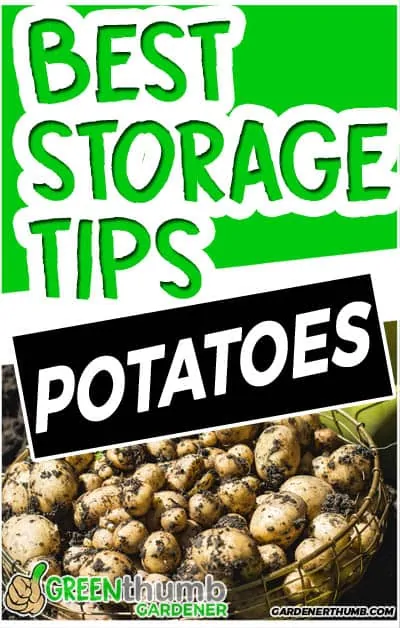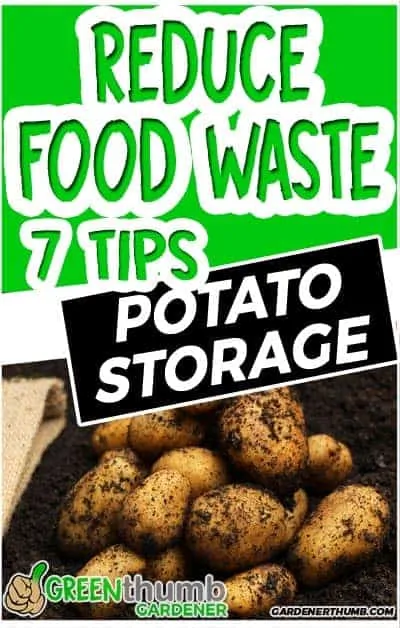How Long Do Potatoes Last | Tips to Maximize Shelf Life
Last updated: 10/31/21
Potatoes are such a good crop that can last well into the winter should you take the proper precautions with storage.
They are very nutritious and easy to cook.
Its no wonder why Americans love their spuds. Everything from french fries to baked potatoes.
You will learn the shelf life of potatoes, plus some tips on how to make potatoes last longer.
Green thumb Gardener occasionally links to product and/or services offered by vendors to assist you with all your gardening needs. Some of these may be affiliate links, meaning we earn a small commission if items are purchased.
Want to Download a Garden Hack Guide for FREE

Enter your email below and we will send you a guide to help you SAVE money in your garden.
The shelf life of potatoes depends on the different storage methods that you follow.
Potatoes that are freshly harvested will last for 4 weeks in the fridge. Cooked ones will last for approximately 3-5 days in the fridge.
Frozen potatoes will last for 2-12 months in the freezer depending on your preparation techniques.
There is more to just placing potatoes in your pantry. We will explore the many different ways to extend how long potatoes last.
Our suggestions are based on the premise that you properly follow the practices of food preservation.
As always, use your best judgment when trying to determine when something is spoiled.
Let’s delve into the 7 tips to save your potatoes from spoiling too early.
You can also find some tips about the shelf life of sweet potatoes as there is some difference. Check it out here.

1 – How Long Do Potatoes Last at Room Temperature | Shelf Life of Potatoes
At room temperature – around 70 degrees Fahrenheit – potatoes can last for 1-2 weeks if properly stored.
Storing potatoes at room temperature is optimal since it’s more convenient than refrigeration.
Ideally, you should ensure a storage temperature of 45-55 degrees Fahrenheit, which is warmer than in a fridge but cooler than room temperature.
In a pantry with such temperatures, potatoes can last 2-3 months.
Some potato varieties last longer than others. In particular:
- Potatoes that take over 90 days to mature tend to last longer than varieties that mature quickly.
- Potatoes with thick skin usually last longer than potatoes with thin skin.
Among potato varieties that are best for long-term storage are:
- Katahdin
- Kennebec
- Red Pontiac
- Russet
- Yellow Finn
- Yukon Gold
2- How Long Can You Keep Potatoes in the Fridge | Shelf Life of Potatoes in the Refrigerator
When refrigerated, potatoes can last for approximately 3-4 weeks.
However, storing whole raw potatoes in a refrigerator is not ideal since they can develop a sweet taste and get dark when cooked.
Only store raw potatoes in a refrigerator if your pantry space is filled or is too hot.
Cut raw potatoes shouldn’t be left in the refrigerator for too long – use them within 24 hours.
Well, if you are cutting potatoes, you probably are going to do something with them soon anyway.

3- Shelf Life of Potatoes in the Freezer | How Long do Potatoes Last in the Freezer
Potatoes don’t freeze well. At freezing temperatures, the water inside the potatoes forms crystals that break down the vegetable’s cell structures.
This makes potatoes mushy and inedible when defrosted. And yeah, the sweetening issues are still present with freezing.
It is ideal to cut them into french fries or wedges and fry them partially. This helps to cook out the water content and makes for better freezing.
Generally, these partially cooked potatoes will last for 2-3 months in the freezer before they lose their flavor.
4- How Long do Potatoes Last When Cooked
When cooked, potatoes can be stored refrigerated or frozen.
When refrigerated, cooked potatoes last 3-5 days. In a freezer, you could get 10-12 months out of your cooked potatoes.
To be more precise, potatoes retain their best flavor during 10-12 months if frozen at 0 degrees Fahrenheit.
They will stay edible thereafter, but they may not retain their flavor properties.
5- How to Store Potatoes | Best Ways to Store Spuds
The shelf lifetimes mentioned above can be achieved only in proper storage conditions.
With that being said, let’s find out how to properly store potatoes.
We’ll go over storing both raw and cooked potatoes.
Raw potatoes
- Inspect your potatoes for sprouts, mold, pest damage, shovel damage, or soft spots. Only potatoes free from any kind of damage should be stored for a long time. Potatoes damaged by you while harvesting is safe to eat, but they won’t last long in storage.
- Do not wash the potatoes before storage. Only wash them before use.
- Place the potatoes in a container, e.g. a paper bag, mesh bag, or a basket. No matter what kind of a container you choose, make sure that it has good ventilation for the vegetables. Avoid plastic bags since they don’t allow potatoes to breathe, thus shortening their shelf life.
- Choose a storage area that is cool (45-55 degrees Fahrenheit), humid, and away from sources of light. An unheated basement is perfect for potato storage. Pantries can also work well. In winter, store potatoes in an insulated area, e.g. a garage.
No matter where you store the potatoes, ensure that it satisfies the requirements we mentioned above.
Also, do not store raw potatoes in a freezer or refrigerator – we’ve said earlier that potatoes can get sweet if stored at low temperatures.
- Not all potatoes will go through storage well. You should check on your potatoes occasionally – maybe every other day – to see if there are any potatoes that have gone soft, shriveled, or sprouted. Remove such potatoes so that they don’t make healthy potatoes go bad.
- Make sure not to store your potatoes near other foods. This especially concerns onions – potatoes and onions emit gases that ripen each other, which will eventually lead to the spoilage of both.

Further Reading
Storage Tips for Potatoes from the Garden
Storage rules for homegrown potatoes are a little bit different. Potatoes bought from the store have likely been properly processed.
Needless to say, when growing potatoes yourself, you need to take all steps to ensure that your potatoes are safe and edible yourself.
Curing
First, you need to let your potatoes cure. Cured potatoes have thicker skins and thus longer shelf life.
Here’s how to cure potatoes:
- Pick only perfect potatoes for curing. As mentioned above, damaged potatoes don’t hold up well in the long term.
- Place your potatoes in a cool, humid, and dark area and let them sit there for 1-2 weeks. Don’t remove the dirt yet – it will be easier to do once the skin gets tougher.
- Check on your potatoes occasionally and discard those that have developed mold.
- Once 1-2 weeks have elapsed, again inspect the potatoes and discard those that have imperfections.
Preventing Sprouts
If you are growing your own potatoes, you will need to be a little more careful with storage.
Potatoes bought from the store are mostly sprayed with growth inhibitors that slow down sprouting. Unless you do the same, you will have to deal with sprouts.
Don’t store too many potatoes – you only want to store as many as you will be able to use during the storage period. Potatoes may sprout in a few months after being harvested even in storage.
Sprouted potatoes are safe to eat once you remove the sprouts and the eyes.
The potato will begin to shrivel as starch is converted to sugar to feed the new potato growing from the sprouts if you let them sit for a long time.
With that being said, you may use sprouted potatoes to your advantage by just planting them in your garden.
Cooked potatoes
Cooked potatoes should be stored in airtight containers.
Choose resealable plastic bags designed for food storage. Sealed plastic bags do not allow bacteria to grow or odors to form in potatoes.
Before storing cooked potatoes, make sure that they’ve cooled down. Hot potatoes may raise the temperature inside the fridge, which may place other food in the temperature danger zone.
As mentioned earlier, cooked potatoes last 3-5 days in the fridge and 10-12 months in the freezer.
6- How to Tell if Potatoes Have Gone Bad
Potatoes eventually go bad even if stored in perfect conditions. Fortunately, it’s rather easy to spot potatoes that have fallen victims to spoilage.
Among the telltale signs of spoiled potatoes are:
- Greenness – The green skin is a sign of a high concentration of toxins like solanine. After the removal of the skin, potatoes are generally safe to eat. But if the greenness has spread to the inside of the potatoes, then you should avoid eating them. Toxic potatoes will also have a bitter taste.
- Softness or mushiness. Soft and mushy potatoes have a reduced amount of nutrients and are likely spoiled.
- Mold – Potatoes that have developed mold should not be eaten and should be discarded to prevent healthy potatoes from spoiling.
- Deep cracks – If your potatoes have deep cracks, then they probably have gone through rough handling or storage. The deep cracks may allow microorganisms or fungi inside the potato, so avoid potatoes with deep cracks in the skin.
Potatoes with shallow cracks that have occurred while growing should be safe to eat though. - Sprouts – Sprouts form when the potatoes are stored for a long time and/or in high temperatures. As mentioned above, sprouted potatoes are safe to eat, but make sure to remove the sprouts and eyes before use.
You may want to change how you store your potatoes if your potatoes are sprouting unless you’ve specifically planned for them to sprout.
7 – How to Store Potatoes Long Term
Freezing Potatoes
Freezing may be the way to go if you are looking for a long-term storage solution.
You can freeze potatoes either cooked or blanched, but it is more difficult to freeze them raw due to their high water content.
Storage in a freeze-safe airtight bag may help to make storing blanched ones easier.
Unless you have a very specific reason not to cook your potatoes before freezing, you should at least blanch them.
To cook and freeze potatoes, follow these steps:
- Thoroughly wash the potatoes in cold water.
- Decide between blanching, cooking or frying them (french fries).
- Peel them (if necessary) and cut them in quarters or smaller pieces depending on what dish you want to prepare
- You can partially blanch or fry them to kill off any enzymes and shorten the final cooking period.
- Place the cooked or blanched potatoes in sealable containers after you let any water or oil drain off.
- Place the container into the freezer.
Storing Cooked Potatoes
Cooked potatoes need to be stored in airtight containers or resealable plastic bags. The process is the same as outlined in the freezing section.
You may choose to refrigerate or freeze your potatoes, but remember that when refrigerated, the cooked ones last much shorter than when frozen – 3-5 days versus 10-12 months.
Drying Potatoes
You can opt for drying your potatoes if you don’t have enough space in your freezer refrigerator.
To dry them, follow the steps below.
We are going to overview drying potatoes in a food dehydrator:
- Clean and scrub each potato. It is best to cut any blemishes or imperfections off of the potatoes.
- Slice the potatoes in a somewhat thin size. Think of a potato chip but slightly larger thickness around 1/8 inch thick. This ensures they will dry in less time.
- Ensure that your potatoes are placed in a bowl of cold water as soon as you cut them to prevent oxidation or browning.
- You will now blanch the potatoes in boiling water for about 4-5 minutes to kill off any enzymes (this is what turns it brown). You want them to still hold together but not crumble.
- Strain and dry off the potatoes as best as possible.
- Lay potatoes in the dehydrator and dry at about 135 F-140 F for about 8-10 hours.
You can rehydrate the potatoes by soaking them in water for 15 minutes & cook them as you would normally.
Pickling Potatoes for Your Potato Salad
This method involves utilizing an acidic liquid like vinegar to add flavor and possibly help extend its shelf life. Most pickling liquid also includes the usage of salt or sugar to help to brine them.
The pickling recipes you may find to preserve potatoes will help to make them last a little longer in the fridge.
Pickled potatoes will last about 7-10 days in the fridge.
Canning Potatoes
There are 2 methods of canning that we must differentiate. There is the water bath canning and there is pressure cooking canning. Potatoes require the pressure cooking canning method.
Pressure cooking canning methods will ensure that the temperature it is processed or boiled in is well above the temperature to kill off any bacterial spores that can cause botulism. The temperature in a pressure cooker is 250°F or more.
Water bath canning will never reach this temperature, so is not recommended to process potatoes. Botulism spores can actually survive normal boiling temperatures so are not quite killed off using this method.
The best guide that we use for canning and pickling is the Ball Complete Book of Home Preserving. You can find this book here.
More Info
Keep in mind that the information that we provide here is based on recommendations from the FDA, our own observations, and the data from other sources such as the Ball guide we mentioned above.
Please do your own due diligence in determining your own set of guidelines.
This information provided is at your own risk. Use your best judgment. We did our best to present you with the best information we had available at the time of this writing.
The shelf lifetimes are based on the following conditions of your storage area:
- Room temperature of 60°- 70°F
- Refrigerator temperature of 35° – 40° F
- Freezer temperature of 0°F or lower.
Check out our guide on ways of preserving food for more information on some of the techniques.
Related Questions
- How long do mashed potatoes last in the fridge? Mashed potatoes stored in the fridge will last approximately 3-5 days in the refrigerator.
- How long does potato salad last? Potato salad lasts approximately 4-6 days if it is properly stored in the fridge.
- How long do sweet potatoes last? Sweet potatoes will last approximately 3-5 weeks in a cool pantry and 2-3 months in the fridge.








